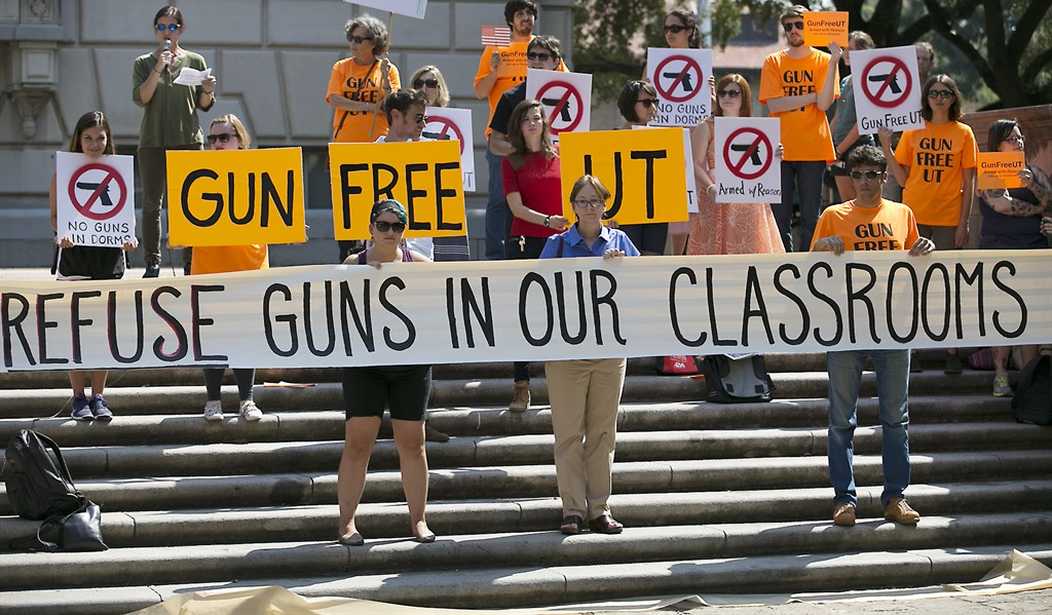With North Carolina losing its veto-proof majority of Republicans in the state House, the chances of a 30th state joining the ranks of Constitutional or permitless carry jurisdictions next year is pretty slim. But there's still plenty of room to add to the states where campus carry is allowed. Right now just a handful of states have laws on the books protecting the right of lawful gun owners to carry on the campuses of public colleges and universities, including West Virginia, where the law changed back on July 1.
The board of trustees at the University of Wyoming is also considering changing its policy and allowing "law-abiding and qualified people" to legally carry in many buildings and open spaces of the state's only public four-year university.
The draft rule, scheduled to be considered by UW's Board of Trustees at its Nov. 20-22 regular meeting, is expected to be posted on the board's website by 5 p.m. Wednesday, Nov. 13.
Current UW regulations do not allow students, employees or anyone else from carrying or storing "dangerous weapons" on campus. However, lawmakers passed a bill earlier this year allowing guns on public school and university campuses.
That bill was actually vetoed by Gov. Mark Gordon, but he encouraged schools, hospitals, and other areas still designated as "gun-free zones" to rethink their policies, which prompted University of Wyoming trustees to take a fresh look at its regulations.
Another push for campus carry is taking place in Texas, where students with Southern Methodist University's Turning Point USA chapter are pushing for the private school to scrap its ban and allow for lawful carry on campus, as is already the case for public colleges and universities in the Lone Star State.
Preston Patten, president of SMU’s Turning Point chapter, believes anyone with a concealed carry permit who is over 21 should be allowed on SMU’s campus.
“We need concealed carry on campus to make students’ lives safer, period,” Patten said. “The number one goal of this movement and this initiative is student’s lives. That’s the one thing we care about.”
Opponents of campus carry have had at least one recent success of their own. Colorado legislators repealed the state's campus carry policy, which had been in place for more than a decade after the state Supreme Court ruled in 2012 that the University of Colorado did not have the authority to prohibit the practice. Though no one could point to any real issues with campus carry, the legislature still included all college and university campuses in their list of "sensitive places" where guns are banned; one of multiple gun control bills signed into law by Gov. Jared Polis this year. On May 31, the Denver Post reported:
Colorado has made it a misdemeanor to knowingly carry a firearm onto school grounds, into a polling place or inside a government building under a law signed Friday by Gov. Jared Polis.
The ban, which takes effect July 1, includes the open and concealed carry of firearms, and it applies to public and private schools as well as colleges, universities and child care centers. It contains exemptions for law enforcement, military and security personnel, along with some others who carry guns as part of their official duties. Permitted concealed-carry permit holders can have a firearm in parking lots adjacent to banned locations.
Several other proposed gun-free zones were stripped from the bill as it moved through the legislature.
A misdemeanor offense isn't going to stop someone with evil intentions from bringing a gun onto campus and using it to cause harm to others, but it probably will prevent most lawful gun owners from having a gun with them for personal protection. The would-be carjacker won't care about catching a misdemeanor charge, but the mom heading back to her car in the dark after teaching or taking an evening class can't risk breaking the law so she can feel safer.
The folks impacted by campus carry prohibitions are the ones who aren't the problem. Critics of campus carry would also say they're concerned about negligent discharges or lawfully-carried guns being lost or stolen, but those concerns can be addressed through on-campus training for gun owners; not mandated, but highly encouraged. Frankly, that's something colleges and universities should be offering regardless of their campus carry policies. Despite the best efforts of the gun control lobby, firearms are here to stay, and responsible gun ownership should be promoted just like universities encourage responsible drinking.
States like California, Massachusetts, and New Jersey aren't going to adopt campus carry laws, but what about the constitutional carry states of Oklahoma, Florida, or Louisiana? The issue isn't a slam dunk, and Second Amendment supporters would definitely have to engage lawmakers on this issue to make it happen, but the payoff in personal safety and individual liberty is worth the effort.









